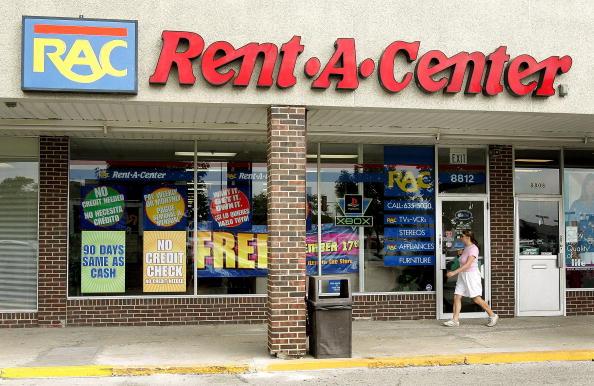Pennsylvania Prosecutors Pursue Charges For People Who Fall Behind On Rent-To-Own Payments
The state’s “theft of leased property” statute allows prosecutors to seek felony charges for Pennsylvanians who miss payments on rental items.

On April 30, Nicolas Harmony spent the night in jail in Franklin County, Pennsylvania. The 23-year-old Chambersburg man missed a criminal court appearance and was picked up on a bench warrant. After paying a bondsman to post his $25,000 bail, Harmony was released the next day.
But Harmony’s case did not involve an assault or even robbery: His crime was falling behind on payments for his bed and washing machine.
In July 2016, Harmony went to an Aaron’s rent-to-own store near Chambersburg and purchased a bed. Soon afterward, he signed a contract with the company for a washing machine.
Court records do not state how much Harmony was required to pay for either contract. However, the least expensive bed similar to the one Harmony purchased currently sells for $1,400 through Aaron’s and requires a $124 monthly payment. The washer and dryer set with the lowest monthly payment has a sale price of a little more than $1,100 and monthly payment of $80.
In September, Harmony missed his monthly payment. But instead of sending his case to a collection agency, Aaron’s sought a private criminal complaint that was approved by Magisterial District Judge Kelly Rock alleging Harmony had stolen the bed and washing machine. He was then charged by the Franklin County district attorney’s office with a felony under Pennsylvania’s theft of leased property law which states that “a person who obtains personal property under an agreement for the lease or rental of the property is guilty of theft if he intentionally deals with the property as his own.” The statute is used by rent-to-own companies to turn the criminal justice system into their debt collector.
Harmony’s case was dismissed in June under a Pennsylvania court rule that allows for the imposition of court costs and restitution instead of a criminal conviction for the defendant. In Harmony’s case, he was ordered to pay Aaron’s more than $2,000 in restitution and over $200 in court fees and costs. A spokesperson for Aaron’s told The Appeal that “while we do not comment on criminal cases involving our customers, Aaron’s, following a 2017 review of its collections practices, has revised its policies to no longer pursue criminal charges against its customers for theft of service.”
Nonetheless, theft of leased property cases are commonplace in Pennsylvania. The Appeal reviewed all criminal dockets filed in the state in 2016 and found 610 cases charged under the statute largely stemming from rent-to-own companies including Aaron’s and Rent-A-Center.
“When [companies] are able to use the criminal justice system to enforce those debts and subject people they’ve already taken advantage of to criminal penalties, that to me is unconscionable,” Myesha Braden, director for the Criminal Justice Project at the Lawyers’ Committee for Civil Rights Under Law, told The Appeal. “That perpetuates mass incarceration. That perpetuates inequality.”
Braden said lenders should obviously expect customers to make payments on their loans, but that many companies make loan terms so burdensome it is nearly impossible for poor people to not default.
Most people charged with theft of leased property in Franklin County end up having their charges dismissed if they agree to pay for the items—as was the case with Harmony—or return them.
Only three of 17 theft of leased property cases filed in the county in 2017 resulted in a conviction, The Appeal found in a review of criminal court records.
Franklin County District Attorney Matthew Fogal told The Appeal that the widespread dismissals of theft of leased property cases does not mean he opposes bringing the charge in the first place. He compared these cases to the writing of bad checks: “the victim simply wants to be made whole financially.”
But these criminal prosecutions can be costly to the county. In one case, Franklin County paid more than $400 to provide a Haitian Creole translator for a defendant whose charges ultimately were dismissed when he returned the items he had been leasing.
For defendants facing a theft of leased property charge, failing to pay back court debt can result in a driver’s license suspension, an arrest, or incarceration.
The theft of leased property charges that landed Harmony in jail is the only criminal case filed against him in Pennsylvania, but unless he petitions and pays to have the records expunged, the arrest will remain on his record even though charges were dismissed.
And had Harmony been convicted of the felony offenses he was originally charged with he would have faced possible probation or imprisonment, as well as more than 300 collateral consequences, according to the National Inventory of Collateral Consequences of Conviction.
For example, anyone convicted of a felony in Pennsylvania is ineligible to hold any job inside a school and can be denied educational financial assistance from the Pennsylvania Higher Education Assistance Agency.
”It’s kind of the unholy alliance between the criminal justice system and debt collectors,” says Braden.
